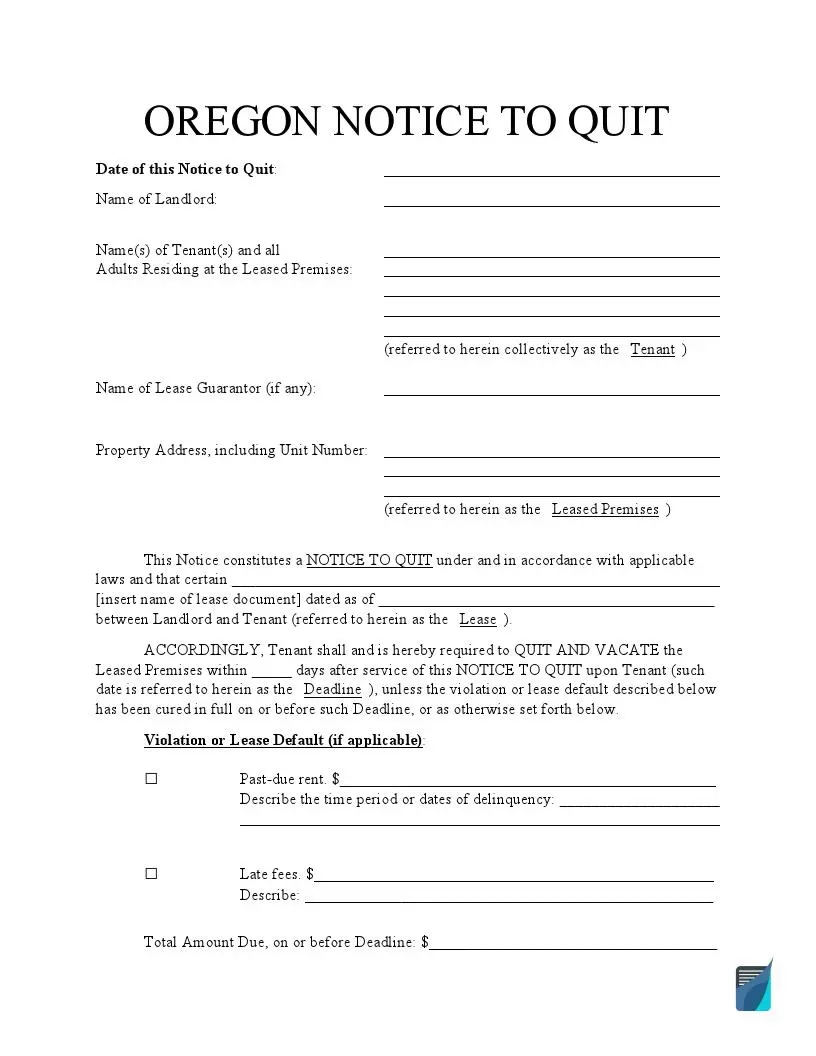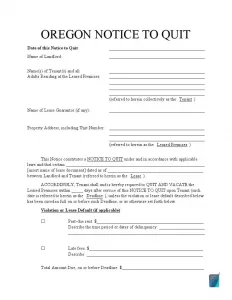Oregon Eviction Notice Forms
In the United States (including Oregon), an eviction notice is a document used by a landlord in case a tenant violates the terms of the rental agreement. There are different situations that can lead to the eviction process: from not paying for rent to causing damage to the property or physical harm to a person on the premises of the rental unit.
In the eviction notice template, a landlord is to include specific information that can vary from state to state. In Oregon, a landlord must choose the proper type of form and provide the correct title for the paper. Furthermore, the state demands that landlords write their personal details and contact information and details of the tenant (tenants), such as full names. Besides, a landlord is required to provide the complete address at which the property is located, the reason the landlord creates the notice, the date by which the renter has to deal with the issue or leave the premises, and the date that the owner created the form.

Build Your Document
Answer a few simple questions to make your document in minutes
Save and Print
Save progress and finish on any device, download and print anytime
Sign and Use
Your valid, lawyer-approved document is ready
A tenant has rights that must be observed during the process of eviction. Before complying with the requests written in the notice, a tenant must read the document carefully. Sometimes a landlord may break the law when deciding to evict their tenant. For instance, changing locks before a tenant receives the notice is considered illegal. In this case, the tenant has a right to require financial compensation. Besides, a renter is allowed to consult with a free attorney and determine if the claim is valid.
Oregon Eviction Laws
Before starting the eviction process, one must find information about the laws regulating the process. In Oregon, all the rules and obligations are included in Chapter 90 and 105 of the Oregon Statutes.
According to Section 90.260(1)(a) of the state law, a landlord has no right to send an eviction notice before the four-day period (also known as Rent Grace Period) of not meeting a monthly or weekly deadline ends. As long as a landlord does not receive payment on the fifth day, they can draw up a letter and send it to the tenant.
In Chapter 105, one can look through all the laws regarding cases when one of the parties takes personal possessions of the other party without permission or makes an entry in a forcible manner. In the given cases, both parties have a legal right to bring the case into court.
Oregon Eviction Notice Laws Details
| Rent Grace Period | 4 days |
| Notice of Non-Payment | 6 days |
| Notice of Non-Compliance | 10 or 14 days |
| State Laws | Oregon Revised Statutes, Chapter 90 |
Eviction Notice Types Used in Oregon
In Oregon, an owner may choose among four particular forms if he or she decides to send such a notice. So, you have to choose a template in accordance with the reason your tenant must vacate the residency before you begin the completion. The list comprises the following types:
30-Day Notice to Quit (for Month-to-Month Lease Agreements)
When a landlord wants to vacate the space and sell, renew the contract, or use the rental unit for other purposes, such a notice should be delivered to a renter. The owner must give the document to the tenant not less than 30 calendar days before the eviction day.
14 or 10-Day Notice to Quit (for Non-Compliance)
If a renter has broken the conditions of a lease agreement, an owner has to send this form to initiate an eviction process and let the tenant deal with the issue within fourteen days. If the tenant violates the term of the contract for the second time within six months after the first conflict, the landlord can refuse to rent out the property to the tenant and give him or her a ten-day grant to move out. Keep in mind that this notice is not filled out to make the tenant pay for rent.
6-Day Notice to Quit (for Non-Payment of Rent)
In case a renter has not paid or has been refusing to pay the rent due time, an owner can choose this template to notify a tenant about the beginning of the eviction process. In Oregon, the form is also known as “144-hour Notice”. You should keep in mind that although the state of Oregon has the rent grace period (which is four days), a landlord is allowed to send this notice if the rent payment has been delayed for three days.
24-Hour Notice to Quit (for Imminent Danger or Illegal Activity on the Premises)
In case a tenant has done something illegal (for instance, he or she has taken or sold drugs or alcohol on the premises of the rental unit), an owner should notify him or her about leaving the property or changing the behavior within 24 hours. The illegal activity also includes prostitution and physical abuse.
72-Hour Eviction Notice (for Non-Payment of Rent)
This notice to pay or quit is created and sent by a landlord if it’s been eight days since the rent due date of a weekly tenancy agreement. If the tenant doesn’t pay the due amount within 72 hours, they must vacate the property. Otherwise, the landlord can file a lawsuit against the tenant to force the eviction.

Popular Local Eviction Notice Forms
Eviction Process in Oregon
If you, as an owner of the premises, seek eviction of your tenant, there are several steps that you must take:
- Notify a Renter
If a tenant does not provide payment on the due day or breaks the lease, the lessor can choose one of the above-mentioned forms and deliver it to a tenant. To download a template, you can make use of our form-building software.
- Bring Your Claim to Court
If a renter decides to ignore your eviction notice, you should apply to the local court. Prepare the necessary documentation (listed below) and be ready to pay some fees. If the court decides that there are grounds to conduct a trial, deliver the copies of the documents to a renter to be aware of the upcoming proceeding. As soon as a tenant receives the papers, he or she may respond with a certain legal form to defend themselves.
- Get a Decision from the Court
Wait for the final judgment in the court. After it has been delivered in favor of the owner, the tenant will have to move out immediately.
Oregon Eviction Court Forms
Applying to the court in Oregon demands the completion and submission of various legal forms. Below is the list of such forms:
- Residential Eviction Summons
The document is used to notify a renter about the claims against them and the future legal process.
- Residential Eviction Complaint
This document describing all details of the claim is submitted to the court by the property owner.
- Answer to a Residential Eviction
If tenants wish to defend themselves by providing reasonable arguments to continue living on the premises, this form is normally filled out and submitted to the court.
- Residential Eviction General Judgement
This legal paper states the verdict of the judge.

Listed below are various other Oregon templates completed by FormsPal users. Check out our step-by-step builder to customize any of these forms to your requirements.
Other Eviction Notice Forms by State
